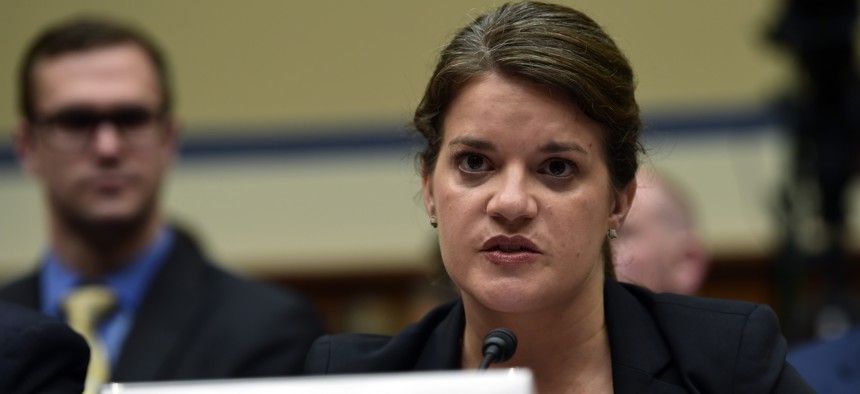Federal Election Security Help Still Needed Ahead of Midterms

New Mexico Secretary of State Maggie Toulouse Oliver Susan Walsh / AP Photo
One state and one local official told a congressional committee that smaller jurisdictions require additional federal technical assistance for priority upgrades to voting equipment and security.
WASHINGTON — Election officials told lawmakers Tuesday that increased federal technical assistance is needed for cash-strapped counties to make key voting equipment and cybersecurity upgrades ahead of the 2018 midterms.
Current federal funding is insufficient for some states and counties to make all the needed election security preparations to protect against interference, Russian or otherwise, both New Mexico Secretary of State Maggie Toulouse Oliver and Weber County, Utah Auditor Ricky Hatch testified to the House Oversight committee in D.C.
The Election Assistance Commission reported disbursing $335 million of $380 million in Help America Vote Act funds recently allotted to states, with a timeline for distributing the remainder coming in the next few weeks. New Mexico received its $3.6 million portion in full and has a five-year plan for spending the money on more robust voting systems and election security programming.
While Toulouse Oliver and Hatch emphasized that smaller, rural counties in particular needed more help, the New Mexico official said her state is as prepared as it can be for the fall elections.
“In terms of what we needed to do and what we need to do to be ready for November, we will be there,” Toulouse Oliver told Route Fifty after the hearing, but New Mexico will continue “to improve and expand our security programs moving forward for future elections.”
Toulouse Oliver said she still wants to perform vulnerability assessments of all 33 counties in New Mexico using Department of Homeland Security resources but is willing to pay a private vendor if the wait is too long.
DHS is improving election systems nationally at “great pace,” said Chris Krebs, National Protection and Programs Directorate undersecretary, and will have intrusion detection visibility on “closer to all 50 states”—compared to the 21 state networks where sensors monitored traffic during the 2016 election.
“The outcome here is not 100 percent security,” Krebs said. “It’s resilience.”
U.S. Rep. Elijah Cummings, a Maryland Democrat and the committee’s ranking member, worried many states still lacked the resources and tools needed to secure their elections. He criticized committee Republicans for finally calling a full election security hearing four months before the midterms, after most states have held their primaries.
A motion by U.S. Rep. Gerry Connolly, a Virginia Democrat, to subpoena Director of National Intelligence Dan Coats to testify before the committee was voted down 17 to 15 along party lines. Democrats said they wanted to hear from Coats after President Trump’s one-on-one meeting with Russian President Vladimir Putin on July 16 in Finland, where the former noted the latter’s “extremely strong and powerful” denial of election interference.
“That was a national embarrassment in Helsinki,” said U.S. Rep. Stephen Lynch, a Massachusetts Democrat. “Our president threw [the intelligence community] under the bus, in front of the world, to side with Putin. You’ve got to be kidding me.”
Krebs reaffirmed DHS’s conclusion that Russia carried out a “multifaceted campaign to meddle in the last election” and the 2018 midterms remain a “potential target” for both nation-state and non-state hackers.
“I’m convinced Russia attempted to undermine the fundamentals of our democracy,” said U.S. Rep. Trey Gowdy, a South Carolina Republican and committee chairman, at the hearing’s outset.
Gowdy and several other committee Republicans defended the lack of public hearings, arguing Oversight regularly engages with DHS, intelligence officials and the EAC via private channels.
“One thing that was really comforting to me was to hear all of the members on both sides speak so unequivocally about their confidence in the intelligence community and what the intelligence community has said about what happened in 2016 with regard to Russia,” Toulouse Oliver said.
The “biggest challenge faced in 2016”—poor dialogue between state and local election and federal intelligence officials—was addressed with the July 13 approval of an Election Infrastructure Subsector Government Coordinating Council, or EIS-GCC, communications protocol, she added.
Counties are further joining the newly created Elections Infrastrastructure Information Sharing and Analysis Center, or EI-ISAC, “alarmingly fast,” Hatch said.
“In terms of this cycle, at this point it may indeed be too late for additional funding,” Toulouse Oliver said. “I think what I am personally looking for, and what I think a number of my colleagues are looking for, is a sustained funding mechanism—something that can be relied upon moving forward that we can build plans around.”
Dave Nyczepir is a News Editor at Government Executive’s Route Fifty and is based in Washington, D.C.
NEXT STORY: 3D scanner speeds police investigations






